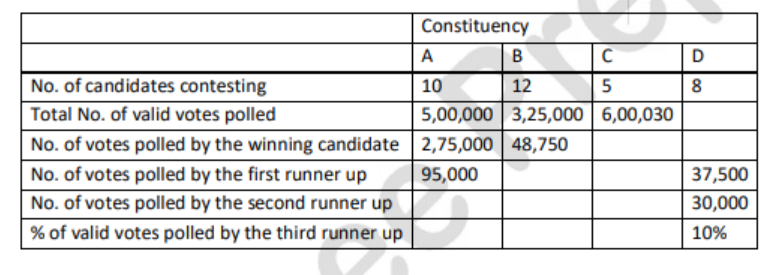In an election several candidates contested for a constituency. In any constituency, the winning candidate was the one who polled the highest number of votes, the first runner up was the one who polled the second highest number of votes, the second runner up was the one who polled the third highest number of votes, and so on. There were no ties (in terms of number of votes polled by the candidates) in any of the constituencies in this election.
In an electoral system, a security deposit is the sum of money that a candidate is required to pay to the election commission before he or she is permitted to contest. Only the defeated candidates (i.e., one who is not the winning candidate) who fail to secure more than one sixth of the valid votes polled in the constituency, lose their security deposits.
The following table provides some incomplete information about votes polled in four constituencies: $\text{A, B, C}$ and $\text{D},$ in this election.

The following additional facts are known:
- The first runner up polled $10,000$ more votes than the second runner up in constituency $\text{A}.$
- None of the candidates who contested in constituency $\text{C}$ lost their security deposit. The difference in votes polled by any pair of candidates in this constituency was at least $10,000.$
- The winning candidate in constituency $\text{D}$ polled $5\%$ of valid votes more than that of the first runner up. All the candidates who lost their security deposits while contesting for this constituency, put together, polled $35\%$ of the valid votes.
What is the percentage of votes polled in total by all the candidates who lost their security deposits while contesting for constituency $\text{A}?$